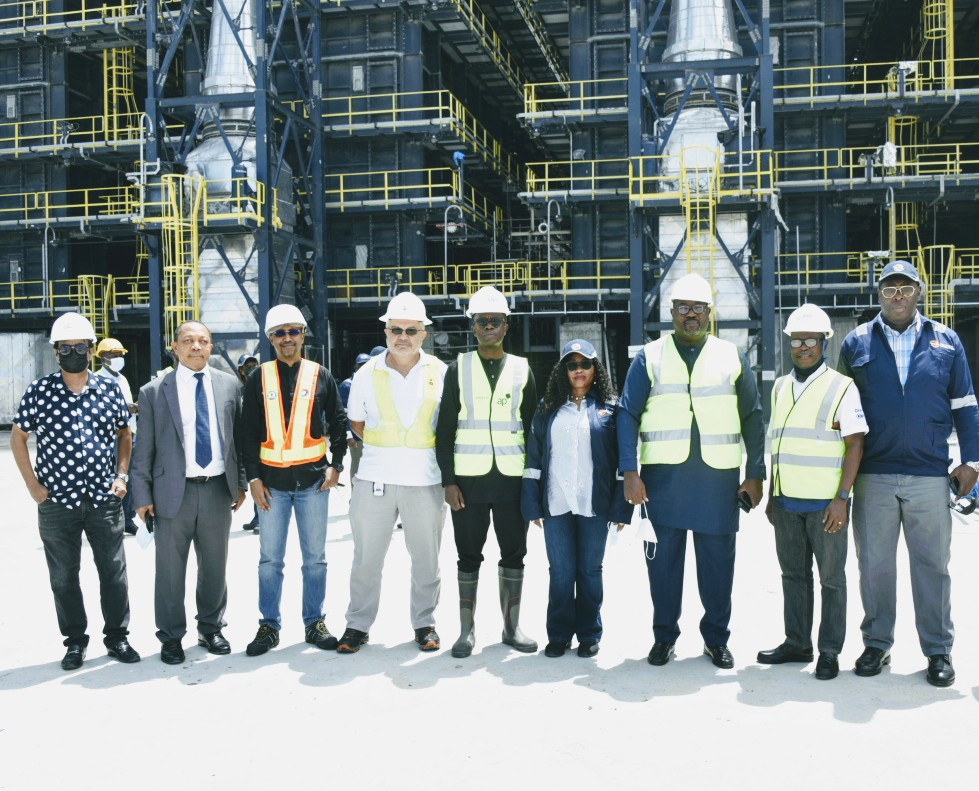Just as the completion of the Dangote Oil Refinery gets closer, the Major Oil Marketers Association of Nigeria (MOMAN) has expressed an intention to engage the management of the company on commercial terms regarding the lifting of its refined petroleum products.
On the 17th of February 2021, the MOMAN CEOs had a virtual meeting with Alhaji Aliko Dangote, the President of the Dangote Group and Mr Edwin, where the Dangote Group presented its project and which culminated to this physical site visit.
The marketers, who toured the 650,000 barrels-per-day single train refinery in Ibeju-Lekki, Lagos recently, expressed belief that the Dangote Oil Refinery would help remove the various bottlenecks associated with importation of petroleum products into the country.
The Association members who visited Dangote Oil Refinery include the Managing Director 11 Plc/ Chairman MOMAN, Adetunji Oyebanji; Executive Secretary of MOMAN, Clement Isong; Managing Director, Total Nigeria Plc, Imrane Barry; Managing Director, MRS Oil Nigeria Plc, Marco Storari; Managing Director, ARDOVA Plc, Olumide Adeosun; Managing Director, NNPC Retail Limited, Elizabeth Aliyuda; and 22 others.
Speaking after a tour of the refinery complex, Oyebanji, said the marketers are eagerly waiting for the completion of the refinery, which is expected to make Nigeria self-sufficient in petroleum refining.
Oyebanji stated, “It is our desire to see our members buy refined products from Dangote Refinery when it comes on stream. We are open to discuss commercial terms with the management of Dangote Oil Refinery regarding lifting of refined products. The impact it will have on the market chain will be changed from a situation whereby a marketer will have to wait for four to five months through imports lead time before getting products.
“The turn-around time is going to be much faster. It will be more efficient. Getting products from Dangote Refinery will also give us the possibility of getting the product by vessels or by trucking. It is going to have a positive impact on the way we do business in the downstream sector. Hopefully, we believe Dangote Refinery is going to result in delivering decent margins for our members; enough margins for us to begin to rebuild or/upgrade the assets in the industry” he added.
He said that Dangote Refinery would move Nigeria from an import dependent nation to self-sufficiency in petroleum products. “This refinery will move us from import dependent in petroleum product to becoming totally self-sufficient. It will move Nigeria from a situation whereby all the products that we consume will be available locally. It is going to be a very big development and a game changer for us and we are looking forward to its completion,” the chairman added.
Oyebanji expressed hope that the coming on stream of Dangote Refinery would facilitate the deregulation of the downstream oil sector. “I have always agitated for the deregulation of the downstream oil and gas sector. Now, with Dangote Refinery, it makes it easier to achieve. I believe deregulation will come pretty soon the when Dangote Refinery starts working,” he said.
He therefore urged the Federal Government to encourage more investors who have obtained licenses to establish private refineries in the country. “If you have a policy that allows you issue significant numbers of licenses and only a few are utilised, this tells you that there is a problem somewhere, which requires government’s attention. Government needs to have a discussion with the licensees to find out their challenges and how it can be of assistance to them,” he said.
Chief Operations Officer, Dangote Oil Refining Company, Giuseppe Surace told the marketers that the refinery, which has been designed to process a variety of light and medium grades of crude, including petrol and diesel as well as jet fuel and polypropylene.
He said the refinery is billed to produce up to 50 million litres of petrol and 15 million litres of diesel a day, roughly 10.4 million tonnes of the product, 4.6 million tonnes of diesel, and 4 million tonnes of jet fuel yearly, in addition to having a fertiliser plant, which would utilise the refinery by-products as raw materials.
He disclosed that the 650,000 barrels-per-day capacity refinery, which has recorded 90 per cent completion, is expected to address the challenge of petroleum product importation in Nigeria and other African countries.
He said, “If you look at the overall percentage completion, we have achieved good, considerable progress. But that overall includes engineering and design, which is 100 per cent over. Procurement is about 98 per cent over. So, it covers various aspects.”









